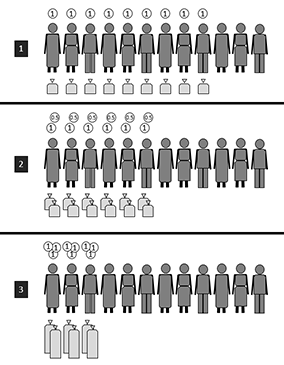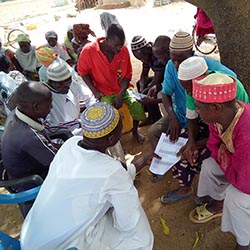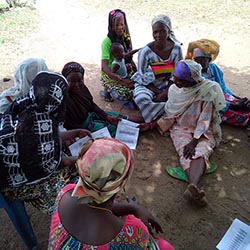Last June, a small case study was done in northern Ghana to investigate how farmers perceived their interactions with N2Africa. Any agricultural development project – N2Africa included – can work with only a limited number of people. This means that some people within a community may benefit more than others. Farmers indeed recognized this. See the two text blocks below:
|
Us: “Why were you interested [in joining N2Africa activities]?” |
| Us: “Do you think that some people benefit more from N2Africa than others?” Respondent: “Yes, but not so much. Those who are involved will tell if you ask. They will not go and share actively, but you can ask. Those who benefit most from the technologies are those who are most serious: they pay attention and apply technologies correctly. |
We then organised a group discussion with about this topic. We put the 40 participants into the shoes of the management team of a hypothetical agricultural project. This project arrives in a community of 12 people and has a total of 9 Ghanaian cedi to spend on training about agricultural practices. The project management can choose between three alternative project strategies (illustrated in Figure 1):
- Spend 1 cedi per person and give 9 people training. With this training, those beneficiaries generate 1 extra bag of crop produce.
- Spend 1.5 cedi per person and give 6 people a more elaborate training. With this training, those beneficiaries generate 2 extra bags of crop produce.
- Spend 3 cedi per person and give 3 people the full training. With this training, those beneficiaries generate a lot of extra crop produce, equivalent to approximately 5 bags.
| Figure 1. Three project strategies for investing a budget in training individuals. Coins: money invested in giving that person training on improved agricultural practices. Bags: extra produce generated by that person as a result of the training. More (intensive) training means a larger yield output. |  |
In lively discussions the participants discussed the different project strategies and after 10 minutes a spokesperson explained their preference.
Each group counted how much extra produce was generated in each of the scenarios. The first group of women chose strategy 3, because the total output was largest. The people who were trained would share their knowledge and their extra output with the others. The second group of women chose for strategy 2 and they explained that if half of the community is trained, those people can easily share information and their extra produce with the other members of the community. The group of men reasoned similarly and chose strategy 2 as well.
Strategy 1 was disliked because the total quantity of extra produce is smallest, and the quantities in strategies 2 and 3 are larger and shareable.
Each group assumed that trained persons would share new information and their extra crop produce with others. We asked plenary whether this happens in reality.
| Participant: “If someone would get a package, there is no rule about harvest sharing, but it is embodied in the group to help each other either with info or with produce.” |
Of the men who were present, all men (7) except one had received the training from N2africa. From the 33 women only 2 had received the training. We asked whether those persons that had not received the training from N2Africa directly, has still received or learned something. Hands were raised by 11 women who claimed that they had learned about the recommended practices. When the members of the ‘N2Africa group’ were receiving the training at the demonstration trial, these women were also there to observe and help out, or they would hear about it from neighbours or at gatherings.
We then reasoned that it may be necessary for a farmer to fully sell his or her improved crop output to be able to save and generate the same output in the next season. If that person shares the output, he or she may not be able to do the same next year. People had not looked at the strategies like that, but there was no room anymore for going into further detail and discuss it in plenary. The translator noticed that the participants were discussing it enthusiastically as we wrapped up. It was a fun game and worth some further playing!
 |
 |
Focus group discussion in northern Ghana, June 2019 |
Eva Thuijsman, Wageningen University & Research, The Netherlands, gratefully acknowledging Harmen den Braber, Peter Anyagri and Rasheed Imoro.
